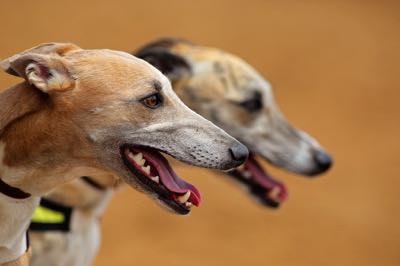 When it comes to betting on greyhound races, you essentially have two choices: bet on the trap or bet on a specific dog. These are fairly self-explanatory, but it is important to know and understand the difference when you head into the bookmaker’s with a wager in mind. It is especially important if you have bet on horses quite a lot in the past and don’t have a wealth of experience when it comes to betting on the dogs. Unlike horses, dogs can’t line up nearly at the start of a race, meaning that they always begin in a trap.
When it comes to betting on greyhound races, you essentially have two choices: bet on the trap or bet on a specific dog. These are fairly self-explanatory, but it is important to know and understand the difference when you head into the bookmaker’s with a wager in mind. It is especially important if you have bet on horses quite a lot in the past and don’t have a wealth of experience when it comes to betting on the dogs. Unlike horses, dogs can’t line up nearly at the start of a race, meaning that they always begin in a trap.
Because of this, it is common for punters to refer to the trap that the dog is in rather than calling them by their name. With some bookies, both options are open to punters but you need to know which one you’re going for or else you might end up putting a bet on the wrong thing. In essence, it is always a good idea to know both the name of the dog that you want to bet on as well as the trap that it is running out of, for this will allow you to ensure that you place the right wager every time you head to the bookmakers.
Why It’s Different at the Dogs
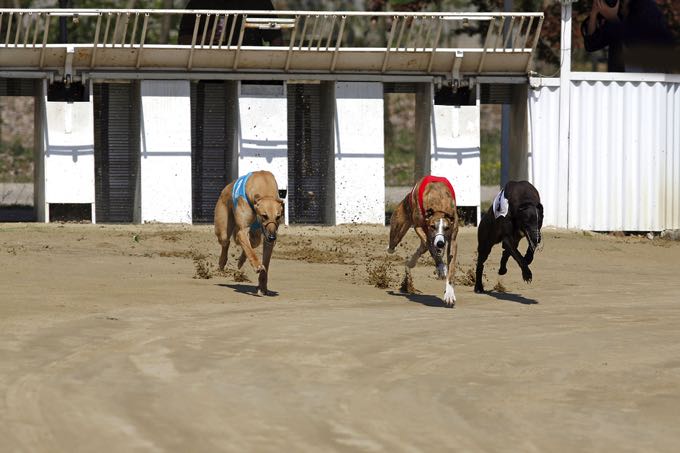
Though there are some racecourses up and down the country that use traps, such as Chester Racecourse, a good chunk of horse races utilise a system whereby the jockeys get the horses to line up at the starting line before they begin racing. This is especially the case in National Hunt event, which is why you don’t tend to see traps in use for the likes of the Grand National at Aintree or Cheltenham’s Gold Cup. With dogs, things work in a different manner, largely because it would be virtually impossible to get them to line up.
The Trap
Instead, a system is used whereby all of the dogs are loaded into their own trap, which are released at the same time. The result of this is that there are numerous external factors that can influence the outcome of a race, not the least of which is that the trap that the dog runs from can impact their ability to win the event. We have covered that in more detail elsewhere on the site, but it is at least worthy of a mention here. The key factor is that the use of traps allows bookmakers to offer an alternatively approach to betting.
Whereas with horse racing it is much more difficult for bookies to offer punters the chance to bet on a specific trap, mainly because they’re not used as much, in greyhound racing the same is not true. They are used for every single race, resulting in bettors being able to bet on the trap without even knowing which dog it is that is located within each trap. Using this option gives you all sorts of options in terms of the bets that you can place, which isn’t quite the same when you’re going off the name of the dog only.
Why Name Betting Matters
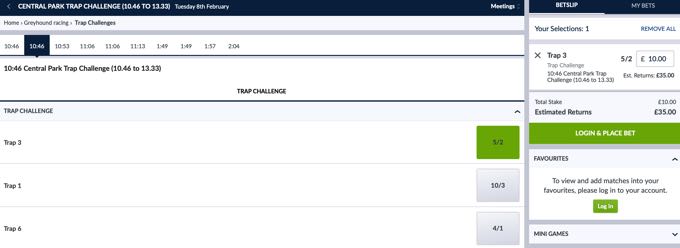
Trap Challenge Betting
Given the fact that you can see which dog is going to be put into which trap, you might well wonder why, exactly, you need to care whether you’re writing a dog’s name or a trap number on your betting slip. The answer comes in the form of what happens if your dog doesn’t start a race for some reason. There are usually reserve dogs for each greyhound race, waiting in the wings in case a certain dog can’t run for whatever reason. This means that you might end up in a situation where your bet ends up being placed on the wrong dog.
Imagine a situation in which you have done a heap of research and realised that there is some value in betting on Good Doggy. You head to your bookmaker of choice and see that Good Doggy is running in Trap 3, so you place your bet on Trap 3 accordingly. The problem is, Good Doggy hurts its leg in the build-up to the race, so it is withdrawn and replaced by All Doggies Are Good. Now your bet is no longer in place on Good Doggy and is instead on the replacement, All Doggies Are Good, and there’s nothing you can do.
If you had placed your bet on the name of the dog then you would have received your stake back in the event that the dog was withdrawn before the race got underway. That is why betting on a dog by name is a more safe thing to do than opting for a trap number. It might limit what you can do in terms of opting for something like the Trap Challenge that some bookmakers offer, but if it protects you from putting a bet on a dog that you’ve never heard of and didn’t want to bet on, then it is worth the difference.
How Do You Know Which One You’re Betting On?
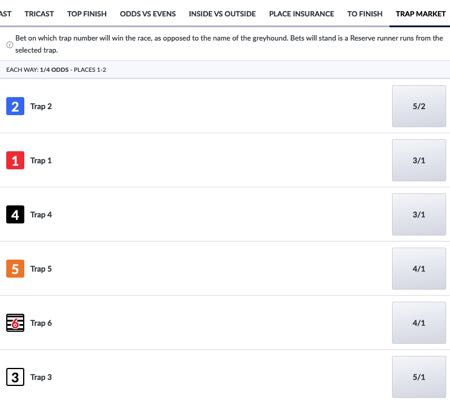 If you have physically gone to an actual bookmaker, you’re in charge of writing on the betting slip and can therefore choose whether you want to write down the trap number or the name of the dog that you’re betting on. If you’re at all unsure about this, make sure to ask the person working behind the counter when you put your bet on. They are always happy to help and will talk you through how you should fill in your betting slip and what the different options are when it comes to the sort of bets that you can place.
If you have physically gone to an actual bookmaker, you’re in charge of writing on the betting slip and can therefore choose whether you want to write down the trap number or the name of the dog that you’re betting on. If you’re at all unsure about this, make sure to ask the person working behind the counter when you put your bet on. They are always happy to help and will talk you through how you should fill in your betting slip and what the different options are when it comes to the sort of bets that you can place.
If, on the other hand, you’re placing a bet online, you should be able to tell from the name of the market which one you’re betting on. If you head to Coral, for example, you’ll see that they offer a specific market that is entitled ‘Trap Market’. On this page, the name of the dog is removed and you’re betting purely on the number of the trap that the dog is located in. On the Each-Way page, on the other hand, you’re given both the name of the dog and the trap that they’re running in, so it’s fair to assume that this is a bet on the dog.
Indeed, in Coral’s small print for the Trap Market it literally says, “Bet on which trap number will win the race, as opposed to the name of the greyhound. Bets will stand if a Reserve runner runs from the selected trap.” This tells you exactly what you need to know in terms of the fact that you’re definitely betting on the trap and not the dog, so you can’t complain if your dog is withdrawn and another dog takes its place. This is why it is so important to make sure that you know which market it is that you’re betting on.
Other bookmakers handle things differently. You might, for example, see one that doesn’t offer a Trap Market specifically in the same way that Coral does, but will maybe specify that you’re opting for trap betting when you look at the market. You could bet on the dogs to finish in the top 3, for example, which offers a selection of two traps, written in the format of Trap 1 & 2, Trap 1 & 3, Trap 1 & 4 and so on. This is effectively a Double under a different name, but uses traps rather than dog names to cover and changes.
Insurance Betting
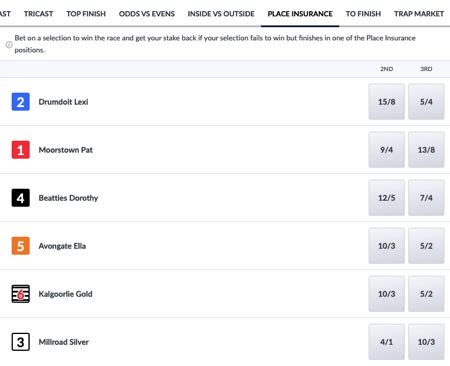 One of the things that is offered by bookmakers that you might want to consider taking them up on is insurance betting. This is usually specifically limited to betting on named dogs rather than the traps, which is why it is worth drawing your attention to here. If we again look to Coral, they offer something called Place Insurance. In this instance, you will get your stake money back if your chosen dog doesn’t win but does manager to finish in one of the assigned place positions for the race in question.
One of the things that is offered by bookmakers that you might want to consider taking them up on is insurance betting. This is usually specifically limited to betting on named dogs rather than the traps, which is why it is worth drawing your attention to here. If we again look to Coral, they offer something called Place Insurance. In this instance, you will get your stake money back if your chosen dog doesn’t win but does manager to finish in one of the assigned place positions for the race in question.
How Odds Change with Place Insurance
That is to say, you’ll be offered the choice of placing a Place Insurance bet that will pay out different amounts depending on how many places you’ve opted to be insured to. Here is a look at a race at Monmore and the various prices offered by Coral depending on whether you’ve opted for a straight Win bet or a Place Insurance wager, as well as the difference in price between the dog finishing second and third:
| Dog Name | Trap Number | Odds for Win | Odds for Place Insurance 2nd | Odds for Place Insurance 3rd |
|---|---|---|---|---|
| Moorstown Pat | 1 | 3/1 | 9/4 | 13/8 |
| Drumdoit Lexi | 2 | 5/2 | 15/8 | 5/4 |
| Millroad Silver | 3 | 5/1 | 4/1 | 10/3 |
| Beatties Dorothy | 4 | 3/1 | 12/5 | 7/4 |
| Avongate Ella | 5 | 4/1 | 10/3 | 5/2 |
| Kalgoorlie Gold | 6 | 4/1 | 10/3 | 5/2 |
As you can see, the odds change rather dramatically if you’ve opted to bet on a dog using the Place Insurance option. The question is, does this work out as better value than if you’ve bet on the dog Each-Way?
Returns with Place Insurance
Here’s a look at how the various options would work out, presuming that you bet £10 Each-Way and the dog came second, or £20 outright on the Place Insurance option. This is because that is how many places Coral were paying out on that event. We’ll offer the money you’d get back for taking the bet, including your stake if applicable:
| Dog Name | Win Returns | Each-Way Returns | Place Insurance 2nd Returns | Place Insurance 3rd Returns |
|---|---|---|---|---|
| Moorstown Pat | £57.50 (If 1st) | £17.50 | £20 | £20 |
| Drumdoit Lexi | £48.12 (If 1st) | £16.25 | £20 | £20 |
| Millroad Silver | £82.50 (If 1st) | £22.50 | £20 | £20 |
| Beatties Dorothy | £57.50 (If 1st) | £17.50 | £20 | £20 |
| Avongate Ella | £70 (If 1st) | £20 | £20 | £20 |
| Kalgoorlie Gold | £70 (If 1st) | £20 | £20 | £20 |
It goes without saying that your best bet would have been one in which the chosen dog won, but we put the payout in the table just to give you a sense of where your wager would end up in each of the different outcomes. You can see that you would have lost money on three of the six occasions on which you chose to place an Each-Way bet rather than Place Insurance. You’d only have won money on one of the bets, drawing even on the two occasions when the odds were 4/1. Does this mean that Place Insurance is better than an Each-Way bet?
That is something that you will have to decide for yourself, but it is certainly interesting to note that you’d only make money once on an Each-Way bet. This certainly suggests that you’d be better off going for Place Insurance as you’d at least get your money back, whereas on three occasions you’d actually lose money on an Each-Way bet. If the odds are 4/1 or greater, you would be better placed opting for an Each-Way wager as the payout will be greater with a bookie paying 1/4 on the places.
The other thing to remember is that you get worse odds when you’re opting for Place Insurance. So yes, you might get more money paid back to you if your dog finishes second or third, depending on what you opted for, but in exchange for that you’ll end up getting paid less if your dog wins the race. That being said, if they do win then you’ll have a £20 stake on the reduced odds, rather than a £10 win and £10 Each-Way bet, which is why you might choose to opt for it in the first place.
